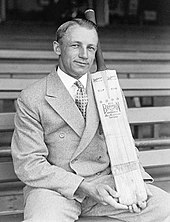
The Fifth Test of the 1948 Ashes series, held at The Oval in London, was the final Test in that cricket series between Australia and England. The match took place on 14–18 August, with a rest day on 15 August. Australia won the match by an innings and 149 runs to complete a 4–0 series win. It was the last Test in the career of Australian captain Donald Bradman, generally regarded as the best batsman in the history of the sport. Going into the match, if Australia batted only once, Bradman needed only four runs from his final innings to have a Test batting average of exactly 100, but he failed to score, bowled second ball for a duck by leg spinner Eric Hollies.[1]
With the series already lost, the England selectors continued to make many changes, on this occasion, four. In all, they had used 21 players for the series and were severely criticised for failing to maintain continuity. England captain Norman Yardley won the toss, and elected to bat on a pitch affected by rain. After a delayed start due to inclement weather, the Australian pace attack, led by Ray Lindwall, dismissed England within the first day for just 52. Lindwall was the main destroyer, taking six wickets for 20 runs (6/20). The English batsmen found it difficult to cope with his prodigious swing and pace; four of his wickets were either bowled or leg before wicket. Len Hutton was the only batsman to resist, making 30 before being the final man dismissed. In reply, Australia's opening pair of Arthur Morris and Sid Barnes passed England's score on the same afternoon with no loss of wickets. The opening stand ended at 117 when Barnes fell for 61 and Bradman came to the crease to a standing ovation and three cheers from his opponents. He fell second ball, but Australia reached 153/2 at stumps on the first day.[2]
On the second day, Australian batsmen fell regularly once Lindsay Hassett was dismissed at 226/3, most of them being troubled by Hollies, who had been selected after taking 8/107 against Australia for Warwickshire. Morris was an exception and he made 196, more than half his team's total, before being run out as Australia were dismissed for 389. Hollies took 5/131. England reached 54/1 at stumps and by lunch on the third day were 121/2, Hutton and Denis Compton batting steadily. However, they suffered a late collapse to be 178/7 when bad light and rain stopped the day's play. Hutton top-scored for the second time in the match for England, making 64. The next morning, Bill Johnston took the last three wickets as England were bowled out for 188, ending the match. Johnston ended with 4/40 and Lindwall 3/50.
The match was followed by speeches from both captains, after which the crowd sang "For He's a Jolly Good Fellow" in Bradman's honour. Having been undefeated in their matches up to this point, the Australians maintained their streak in the remaining fixtures, gaining them the sobriquet of The Invincibles.
- ^ "Sir Donald Bradman player profile". ESPNcricinfo. Retrieved 18 May 2008.
Sir Donald Bradman of Australia was, beyond any argument, the greatest batsman who ever lived and the greatest cricketer of the 20th century. Only WG Grace, in the formative years of the game, even remotely matched his status as a player.
- ^ This notation, when discussing batting figures, means that the batting team scored 153 runs, but lost two wickets in doing so.